Earthquake in China
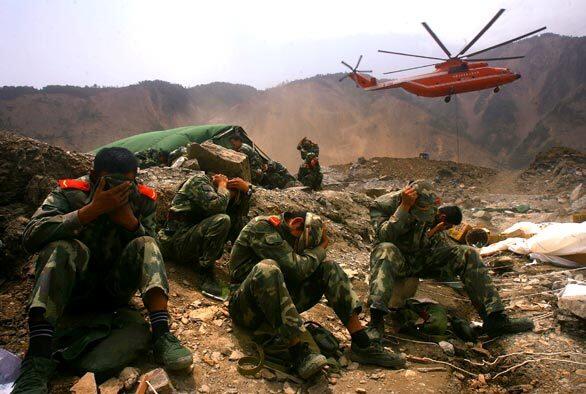
Soldiers take cover as a helicopter delivers supplies to drain the Tangjiashan mountain “quake lake” in Beichuan County, China. China plans to evacuate 100,000 people threatened by the swelling lake formed by the recent earthquake. China’s Water Ministry has said 69 dams were in danger of bursting. (China Photos / Getty Images)
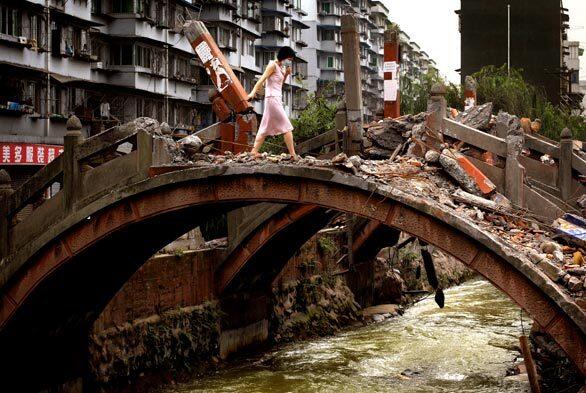
A woman crosses a bridge damaged by the May 12 earthquake in Hanwang, China. (Oded Balilty / Associated Press)
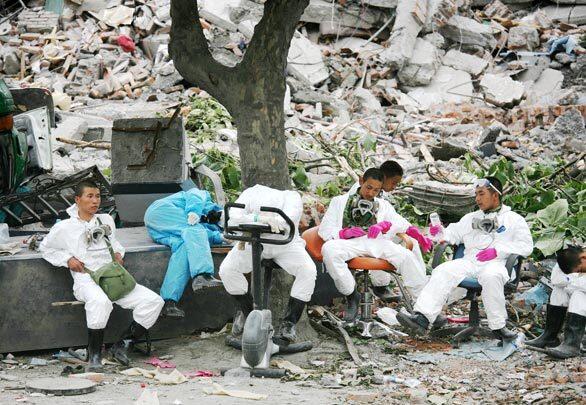
Chinese rescue workers rest after searching for the bodies of earthquake victims in Yingxiu, China. (David Guttenfelder / Associated Press)
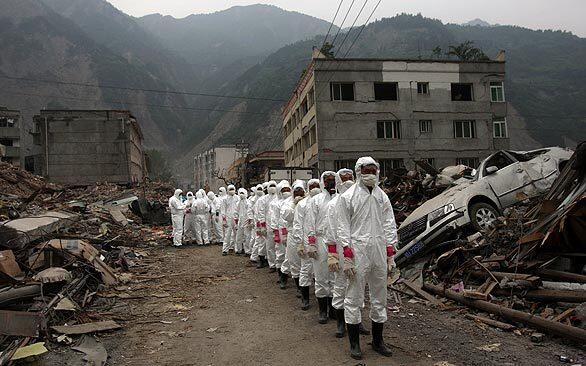
Chinese rescue workers line up to leave the area for they safety as authorities prepare to destroy earthquake damaged buildings using explosives and construction equipment in Yingxiu in Wenchuan County of southwest China’s Sichuan province Tuesday, May 27, 2008. (David Guttenfelder / Associated Press)
Advertisement
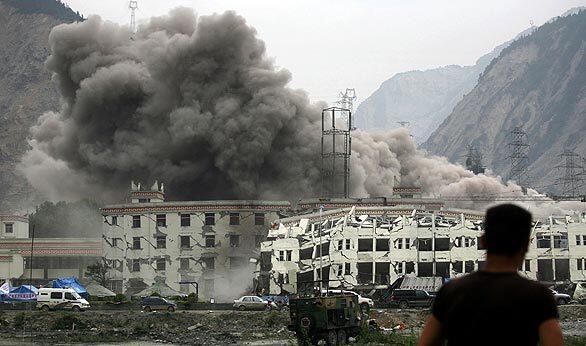
Chinese authorities detonate explosives to try to bring down buildings which were badly damaged in the town of Yingxiu in Wenchuan County of southwest China’s Sichuan Province Tuesday, May 27, 2008. (David Guttenfelder / Associated Press)
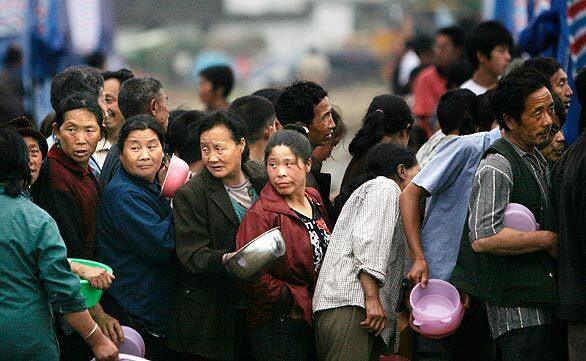
Earthquake survivor line up for food in a refugee camp, after losing their homes in May 12 earthquake at Xiaoba town in Anxian county, southwestern China’s Sichuan Province Tuesday, May 27, 2008. (Oded Balilty / Associated Press)
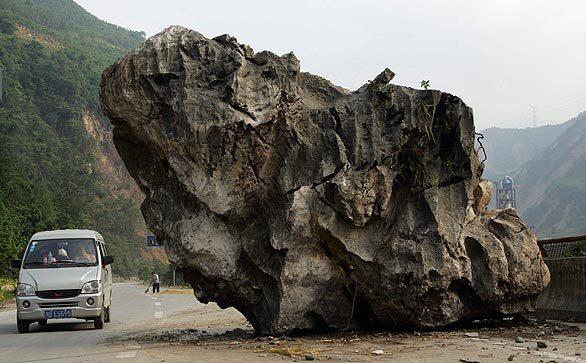
A truck runs past a giant boulder caused by the earthquake at Leigu Township on May 26, 2008 in Beichuan County of Sichuan Province, China. (China Photos / Getty Images)
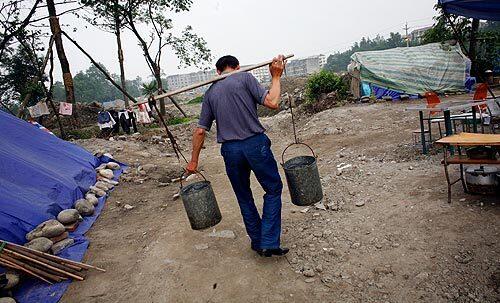
An earthquake victim carries water back to is tent in Dujiangyan, Sichuan province. (Barbara Davidson / Los Angeles Times)
Advertisement
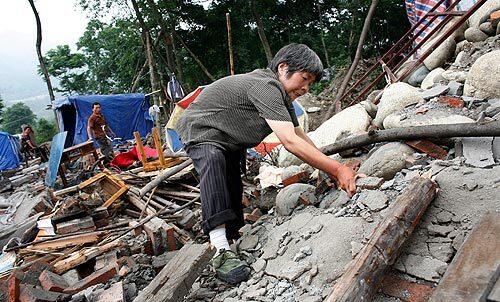
Homeless earthquake victims pull bricks out of the rubble to use as flooring inside their tents in Dujiangyan. (Barbara Davidson / Los Angeles Times)
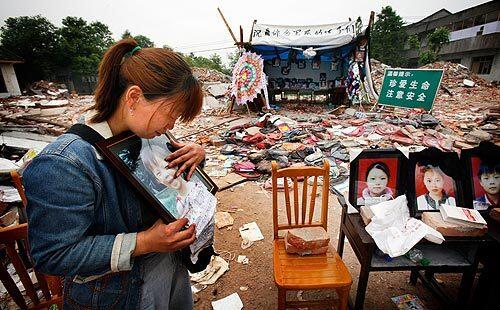
Zheng Rongchong grieves for her daughter Liu Wenbo, 10, who was among as many as 129 students killed in the collapse of Fuxin No. 2 Elementary School.
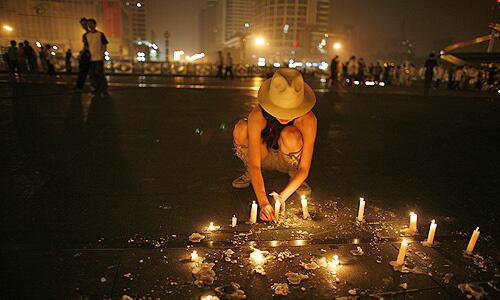
People light candles in memory of earthquake victims at the People’s Square in Chengdu, Sichuan province. (Barbara Davidson / Los Angeles Times)
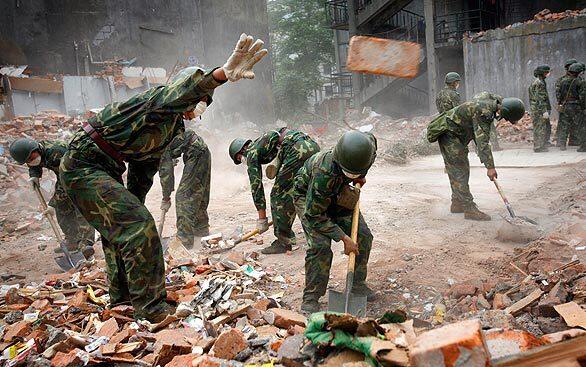
Chinese soldiers clear rubble in the earthquake-hit township of Hanwang in Mianzhu city, north of Chengdu in Sichuan province. (Barbara Davidson / Los Angeles Times)
Advertisement
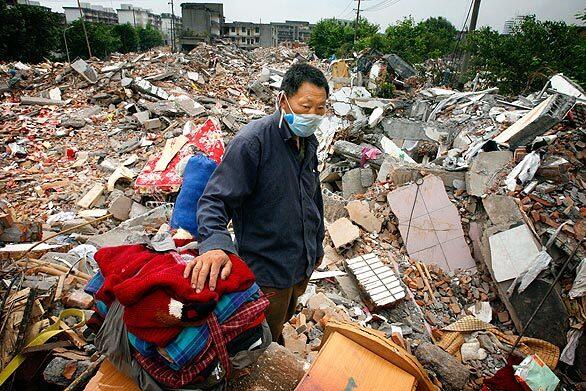
An earthquake survivor delicately folds what clothes he can find from his destroyed home in the quake-hit township of Hanwang in Mianzhu city, north of Chengdu in Sichuan province. In addition to problems associated with a reported 5 million homeless, the emotional scares, the invisible ones, can last much longer as a nation tries to dig itself out and deal with the trauma of loss. (Barbara Davidson / Los Angeles Times)
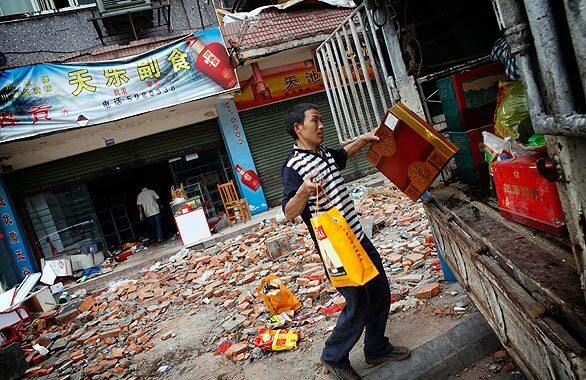
Earthquake survivors retrieve belongings from a shop and place them into a truck in the quake-hit township of Hanwang in Mianzhu city, north of Chengdu in Sichuan province. (Barbara Davidson / Los Angeles Times)
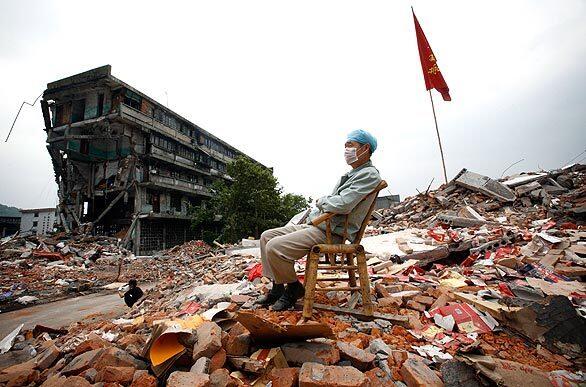
Sitting on a wooden chair in a pile of rubble, an earthquake survivor spends his time looking at his damaged home across the street in the township of Hanwang in Sichuan province. (Barbara Davidson / Los Angeles Times)
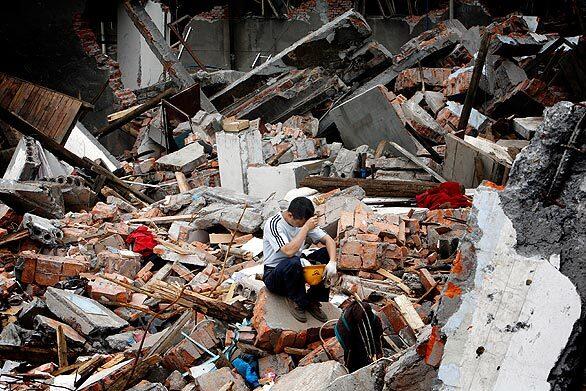
A man observes a moment of silence in the earthquake-hit township of Hanwang during the nation’s official mourning period. (Barbara Davidson / Los Angeles Times)
Advertisement
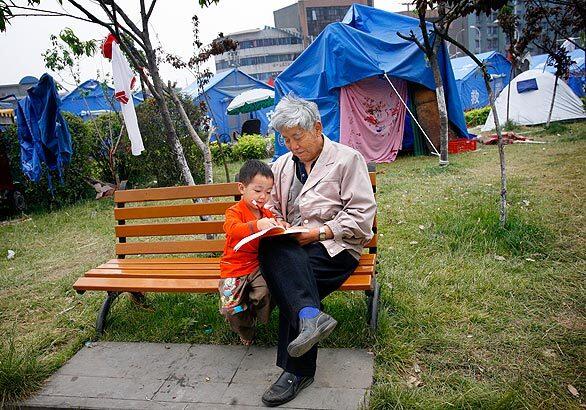
Earthquake survivors read a book together in an evacuee tent center in the township of Hanwang. (Barbara Davidson / Los Angeles Times)
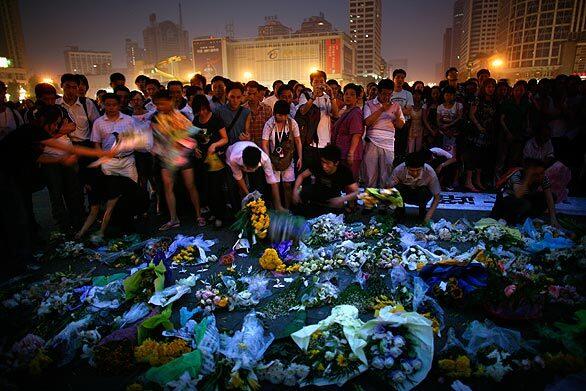
People place flowers and light candles in memory of earthquake victims at the People’s Square in Chengdu, Sichuan province. (Barbara Davidson / Los Angeles Times)
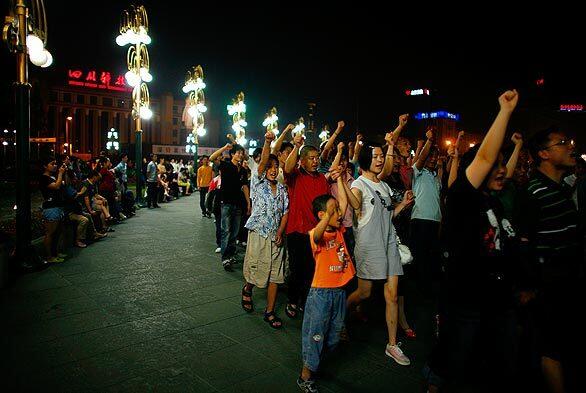
People chant national slogans to keep the country strong at the People’s Square in Chengdu, Sichuan province. (Barbara Davidson / Los Angeles Times)
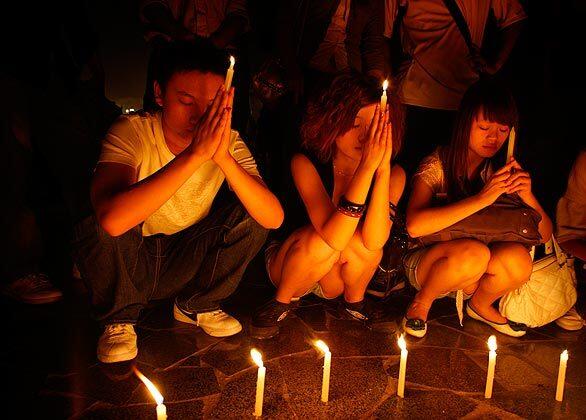
People hold candles in memory of earthquake victims at the People’s Square in Chengdu, Sichuan province. Streets were eerily empty as many shops shut their doors in response to a government call for three days of public mourning. (Barbara Davidson / Los Angeles Times)
Advertisement
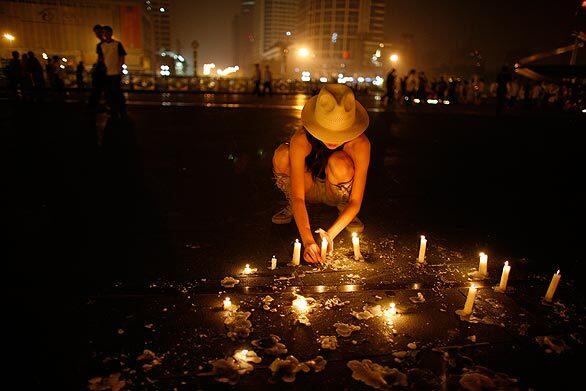
A mourner leaves a candle in memory of earthquake victims at the People’s Square in Chengdu, Sichuan province. Streets were eerily empty as many shops shut their doors in response to a government call for three days of public mourning. (Barbara Davidson / Los Angeles Times)
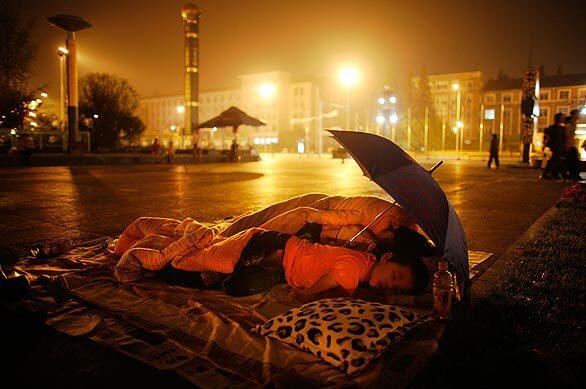
Those left homeless by the earthquake sleep in People’s Square in Chengdu. (Barbara Davidson / Los Angeles Times)
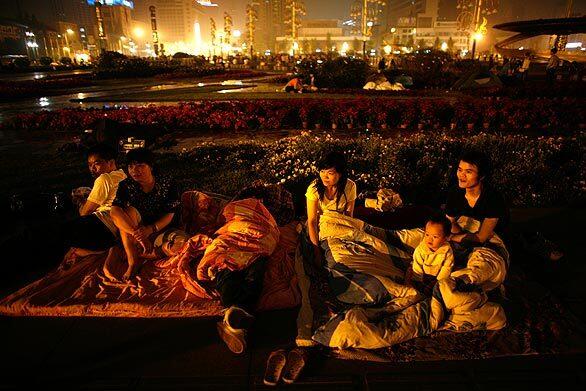
Residents choose to sleep outside in the main square in Chengdu, China. Many residents left their homes after new warnings of possible strong aftershocks. (Barbara Davidson / Los Angeles Times)
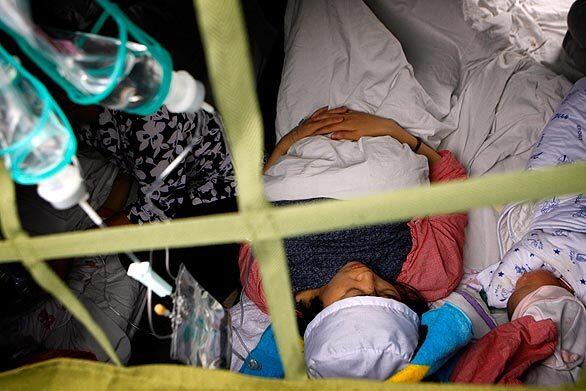
A maternity hospital has set up a tent camp in the middle of a busy intersection in downtown Chengdu as a safety measure. Warnings of severe aftershocks for the next few days have forced many to camp out in the streets of downtown Chengdu, fearing that weakened buildings may collapse from more tremors. (Barbara Davidson / Los Angeles Times)
Advertisement
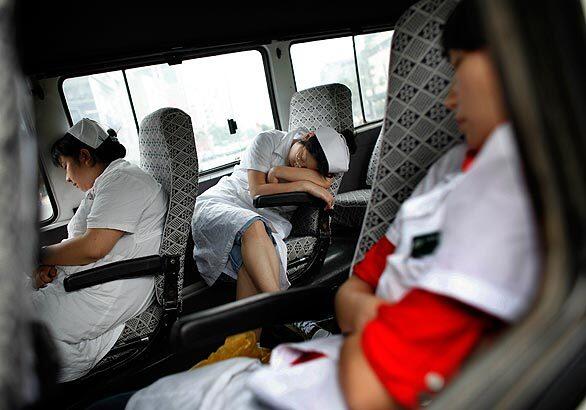
Exhausted nurses sleep in a parked bus where a maternity hospital set up a tent camp in the middle of a busy intersection in downtown Chengdu. (Barbara Davidson / Los Angeles Times)
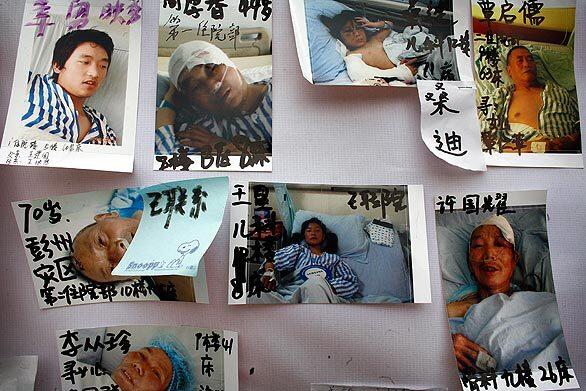
Photos of injured earthquake victims are posted at a downtown hospital in Chengdu, China, so their families can find them. (Barbara Davidson / Los Angeles Times)
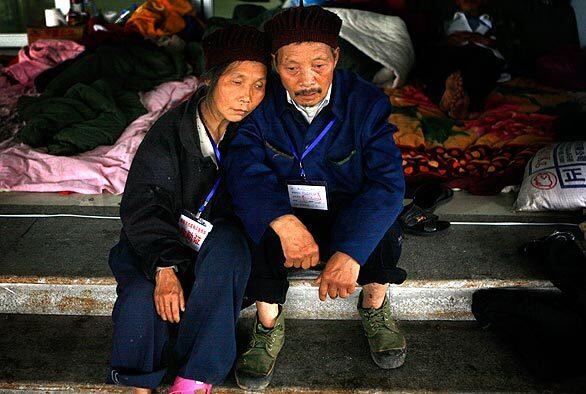
Wu Guangfen, 65,and Deng Jiacheng, 68, married for 40 years, were forced to leave their small village for the first time in their lives by the earthquake. They are seeking shelter at the stadium in Mianyan. (Barbara Davidson / Los Angeles Times)
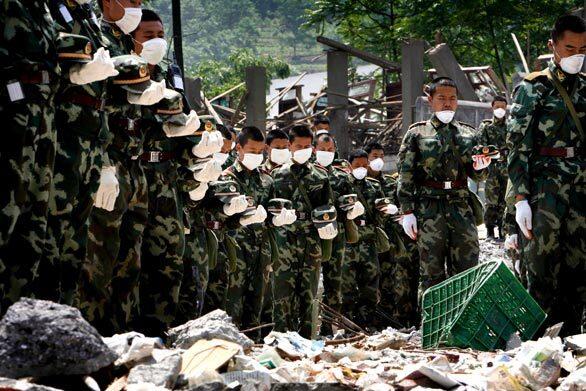
Chinese soldiers observe three minutes of silence Monday in the rubble of a school in earthquake-hit Beichuan County, Sichuan province. From tent cities in Sichuan province to Beijing’s Tiananmen Square, sirens wailed and millions of people stood to mourn the tens of thousands who died in last week’s earthquake. (Barbara Davidson / Los Angeles Times)
Advertisement
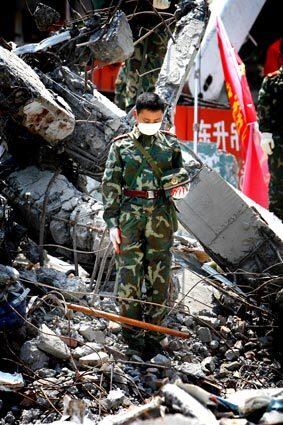
A Chinese soldier observes three minutes of silence in the rubble of a school in earthquake-hit Beichuan County, Sichuan province. (Barbara Davidson / Los Angeles Times)
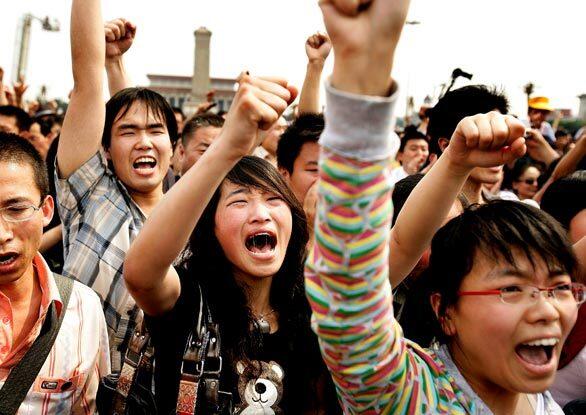
Chinese mourners show their support by cheering for the Sichuan earthquake victims on Monday in Beijing. Three days of national mourning began in China on Sunday. (Adam Pretty / Getty Images)
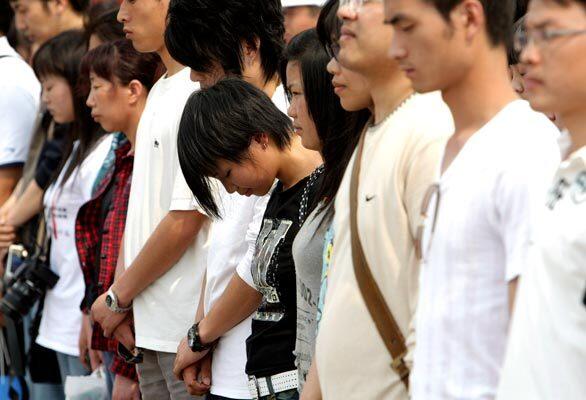
People in Tiananmen Square, Beijing, observe three minutes of silence in remembrance of the Sichuan earthquake victims. China began a three-day period of national mourning Sunday to show respect for the more than 34,000 killed and 200,000 injured by the magnitude 7.9 earthquake that hit May 12. (Oliver Weiken / EPA)
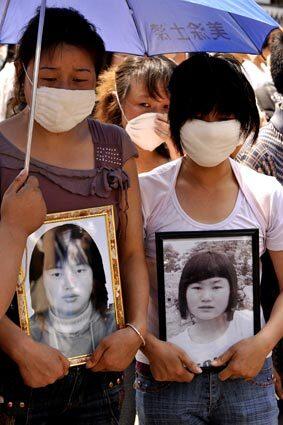
Mothers carry photos of their daughters who died when the Juyuan Middle School near Dujiangyan was destroyed in the devastating earthquake. It is estimated that about 900 pupils died in the school. (Peter Parks / AFP/Getty Images)
Advertisement
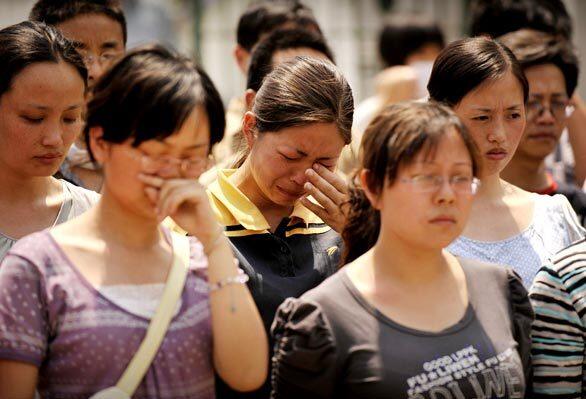
A woman cries as people gather at a ceremony at the remains of the Juyuan Middle School near Dujiangyan. The school was destroyed in the devastating earthquake, and an estimated 900 pupils died. (Peter Parks / AFP/Getty Images)
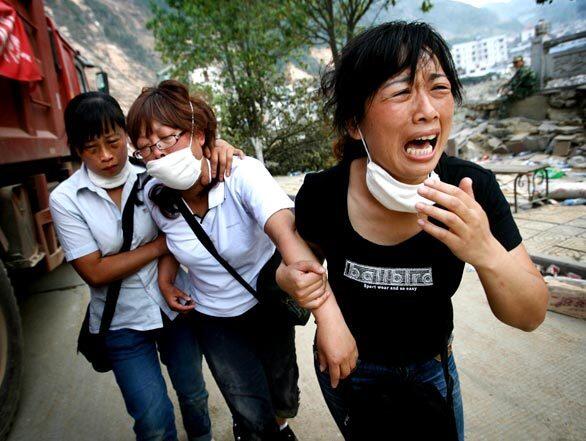
An earthquake survivor leads family members to the building where her child died. Ten of their relatives were killed in the earthquake that struck Sichuan province in China on May 12. Thousands of people remain buried in collapsed buildings from the 7.9 quake, the nation’s worst natural disaster in three decades. The government has raised the death toll to more than 67,000. (Barbara Davidson / Los Angeles Times)
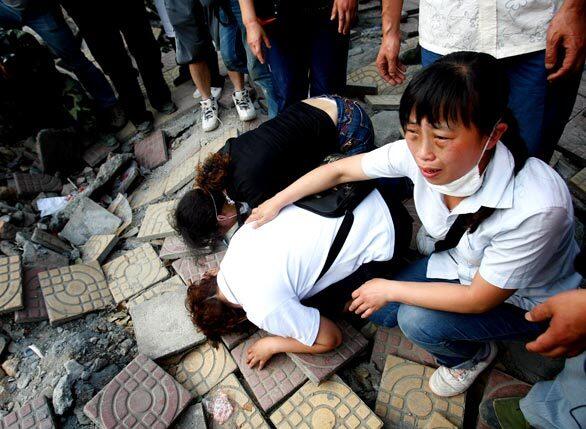
Earthquake survivors mourn the deaths of 10 family members who were killed in the Chinese earthquake. Thousands of people remain buried in collapsed buildings from the magnitude 7.9 earthquake that struck May 12. (Barbara Davidson / Los Angeles Times)
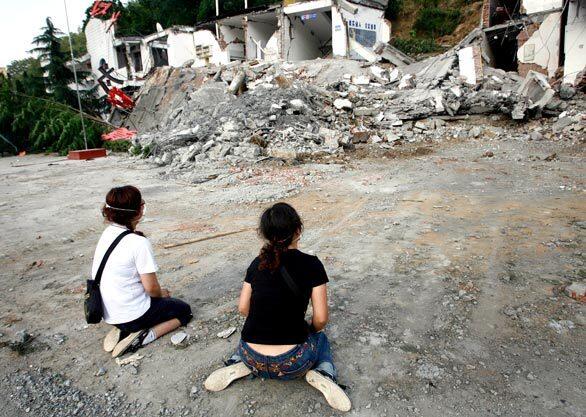
Earthquake survivors grieve in front of the school where the woman on the right says her daughter died. (Barbara Davidson / Los Angeles Times)
Advertisement
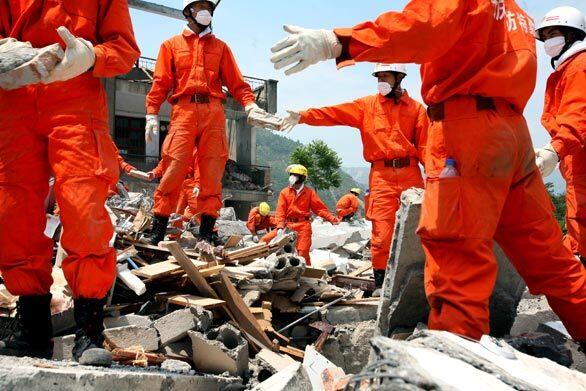
Search and rescue workers sift through rubble in Beichuan County, China. (Barbara Davidson / Los Angeles Times)
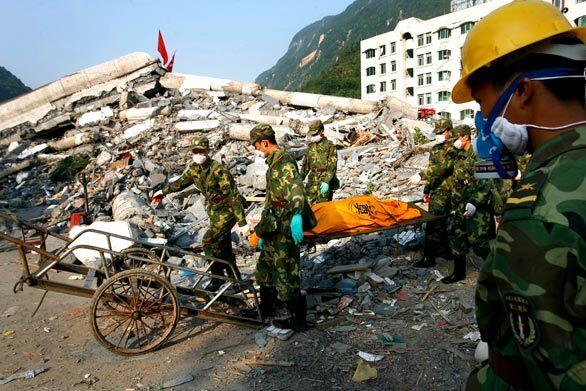
Chinese soldiers retrieve a body from the rubble in Beichuan, China, and bring it to be buried in a mass grave. (Barbara Davidson / Los Angeles Times)
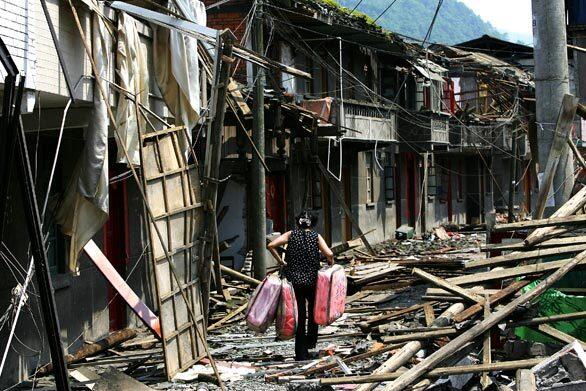
A survivor retrieves her belongings from the rubble in Shifang in Sichuan province. (Andrew Wong / Getty Images)
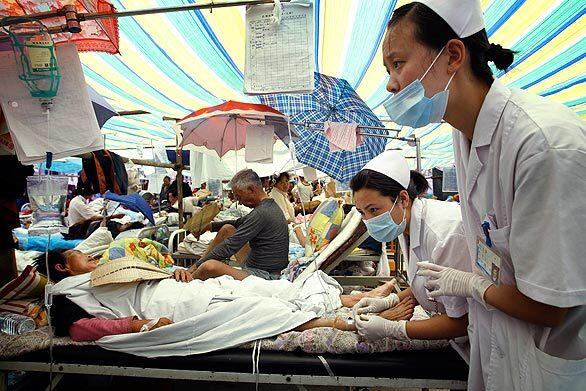
At the 903 Hospital in Jianguyo, China, doctors and nurses are overwhelmed by the devastation caused by the earthquake. They work around the clock to serve the influx of victims in addition to their everyday patients. Because the hospital building is no longer safe to be occupied, it has became somewhat of an open-air facility, with most of the patients living outside. (Barbara Davidson / Los Angeles Times)
Advertisement
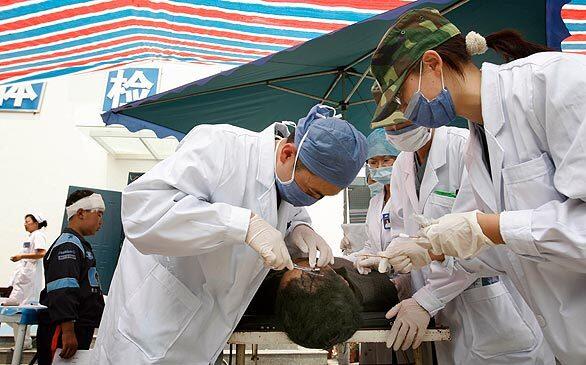
Doctors and nurses tend to an injured victim at 903 Hospital in Jianguyo, China, where care is being provided outdoors because the hospital building is not safe to occupy. (Barbara Davidson / Los Angeles Times)
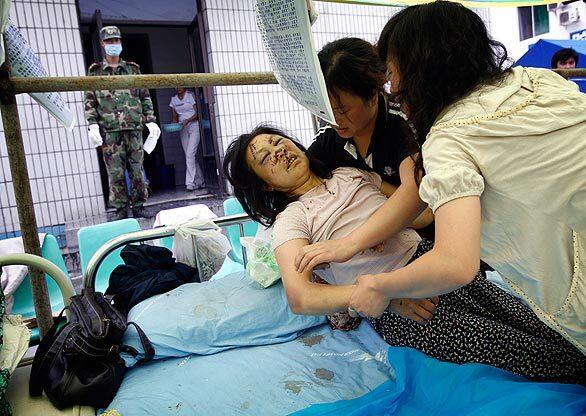
An earthquake victim is moved at the outdoor facilities of the 903 Hospital in Jianguyo, China, Friday. (Barbara Davidson / Los Angeles Times)
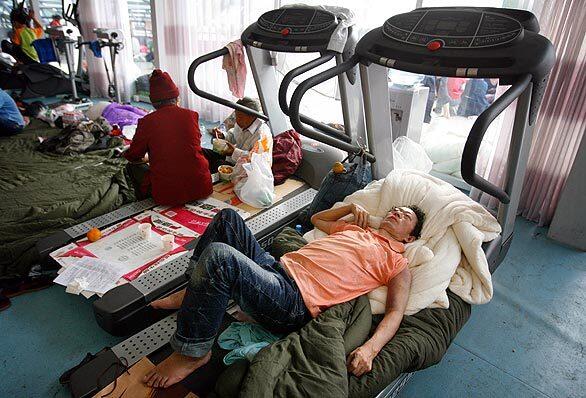
Treadmills have become beds for earthquake victims at the Jiuzhou Stadium in Mianyang, China. (Barbara Davidson / Los Angeles Times)
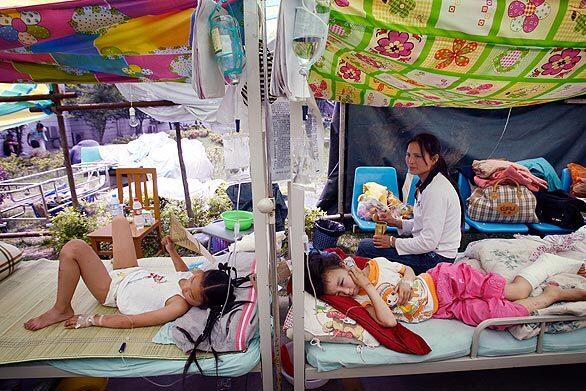
Earthquake victims lie beneath canopies made from blankets Friday at 903 Hospital in Jianguyo, China, where care is being provided outdoors because the hospital building was damaged in the quake and is unsafe. (Barbara Davidson / Los Angeles Times)
Advertisement
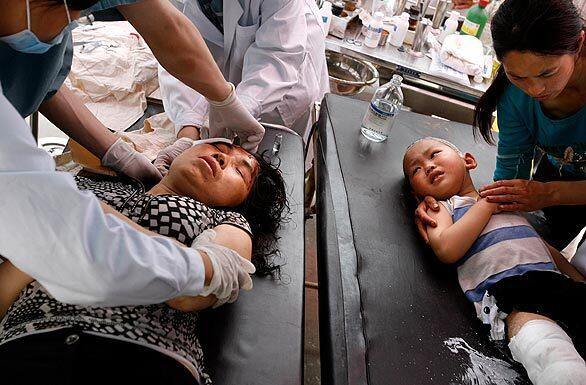
A young earthquake victim with a broken leg watches a woman having her head stitched at the 903 Hospital in Jianguyo, China. (Barbara Davidson / Los Angeles Times)
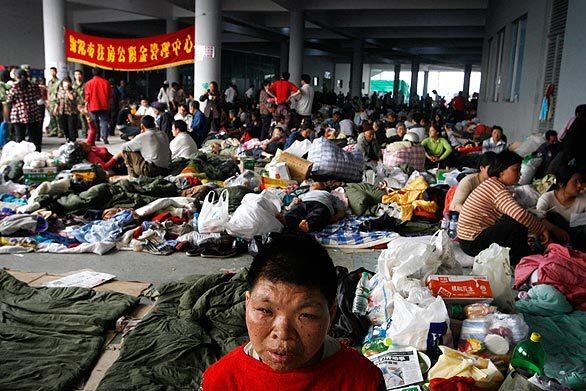
Thousands of earthquake victims are camped out at the Jiuzhou Stadium in Mianyang, China, on Friday. (Barbara Davidson / Los Angeles Times)
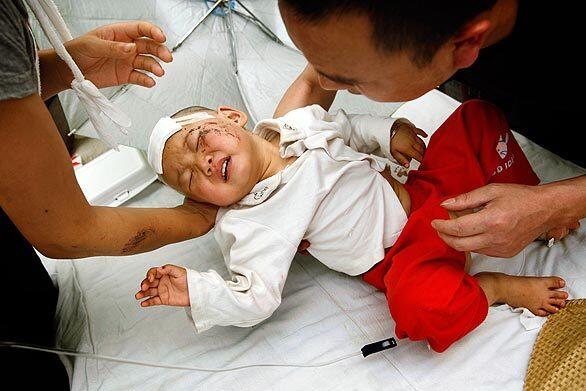
An injured child is comforted by his parents in his hospital bed at the 903 Hospital in Jianguyo, China, on Friday. (Barbara Davidson / Los Angeles Times)
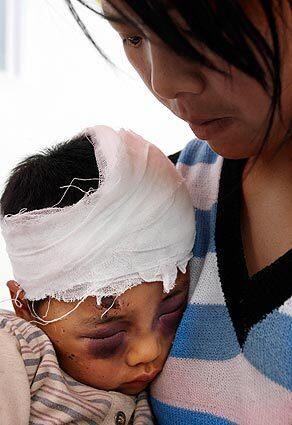
Four-year-old earthquake victim Zhang Jingi is comforted by his mother, Yang Baozhi, at a hospital in Jianguyo. (Barbara Davidson / Los Angeles Times)
Advertisement
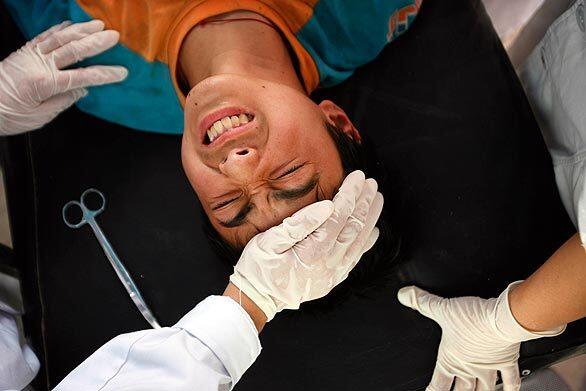
A young earthquake victim grimaces in pain Friday as doctors at the 903 Hospital examine his hand after fingers were amputated. (Barbara Davidson / Los Angeles Times)
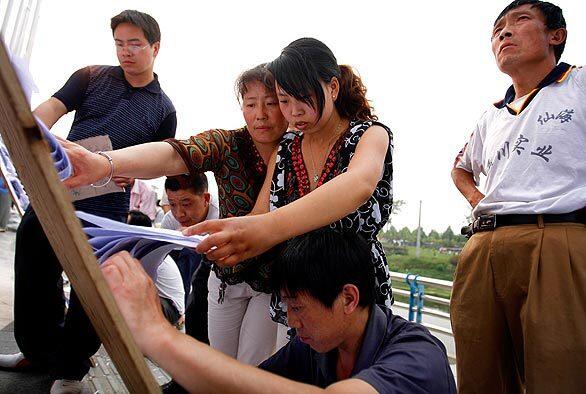
Family members look for lost loved ones on lists at the evacuee center of Jiuzhou Stadium in Mianyang, China, on Friday. (Barbara Davidson / Los Angeles Times)
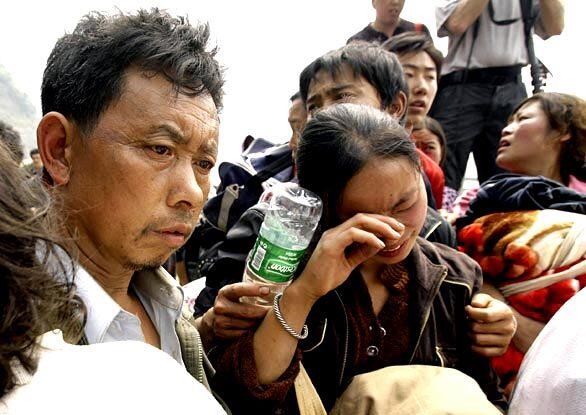
Fatigue shows on faces of earthquake survivors as they wait to get on a truck at the Zipingpu Dam near Dujiangyan. (Vincent Yu / Associated Press)
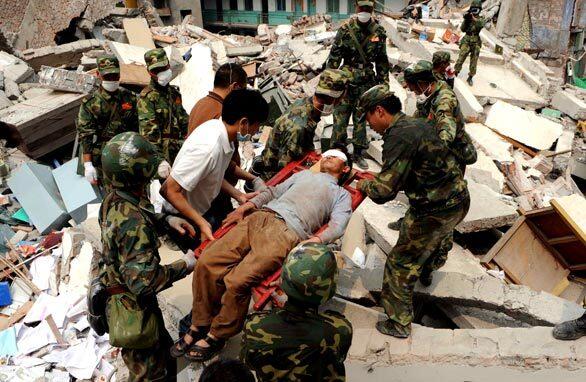
A man is rescued from the debris of a collapsed building 97 hours after Monday’s earthquake in Beichuan County. (Li Xiaoguo / Associated Press)
Advertisement
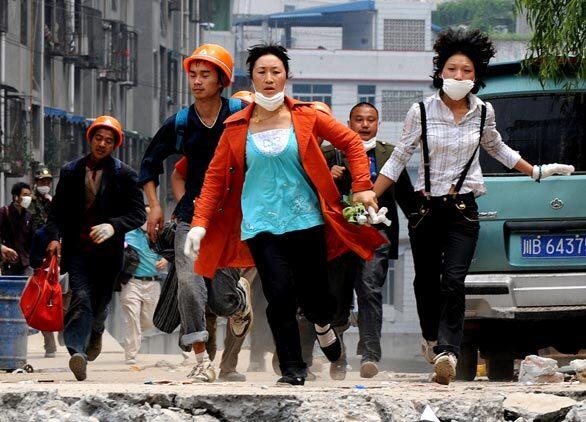
Residents run for safety as an aftershock hit the earthquake damaged town of Beichuan. (Mark Ralston / AFP/Getty Images)
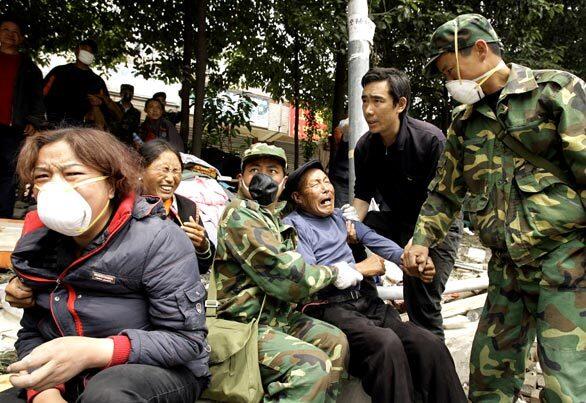
A family cries after their mother’s dead body was found near the rubble of a collapsed building in Dujiangyan. Friday, May 16, 2008. (Vincent Yu / Associated Press)
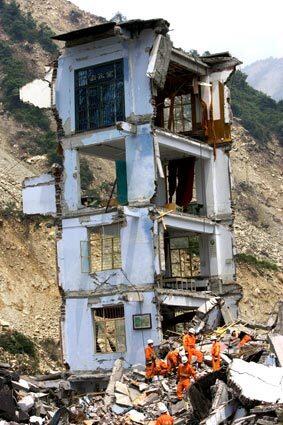
Rescue workers search for survivors near the epicenter of Monday’s quake in Yingxiu. A strong aftershock sparked landslides Friday near the epicenter of this week’s powerful earthquake, burying vehicles and again cutting off ravaged areas of central China. (Ng Han Guan / Associated Press)
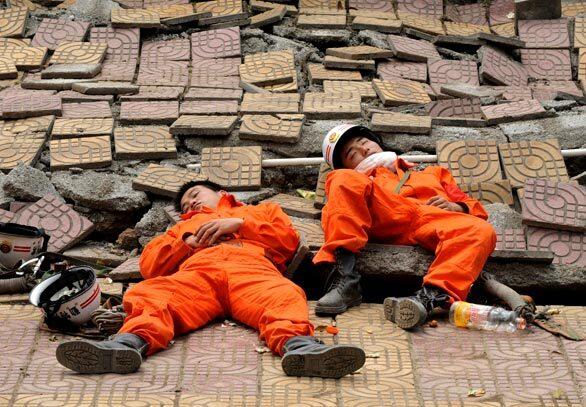
Exhausted rescue workers sleep on damaged pavement in Beichuan. (Mark Ralston / AFP/Getty Images)
Advertisement
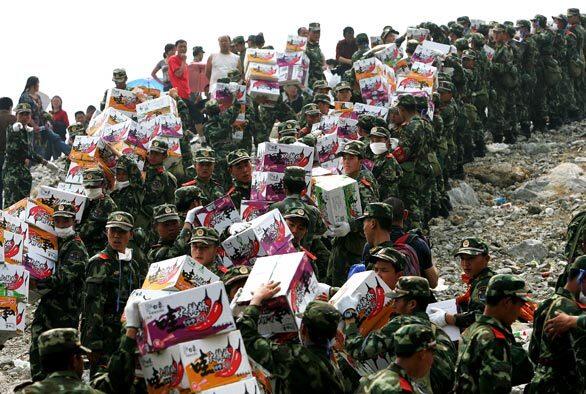
Chinese soldiers transfer earthquake relief supplies to boats at the Zipingba dam. (Guang Niu / Getty Images)
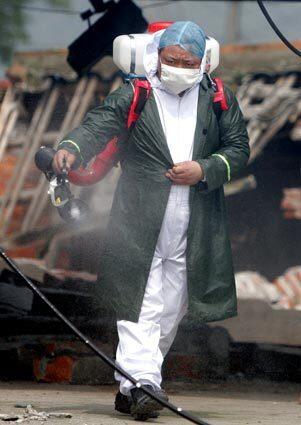
A Chinese medical worker sprays disinfectant at a collapsed building in Shifang. (AFP / Getty Images)
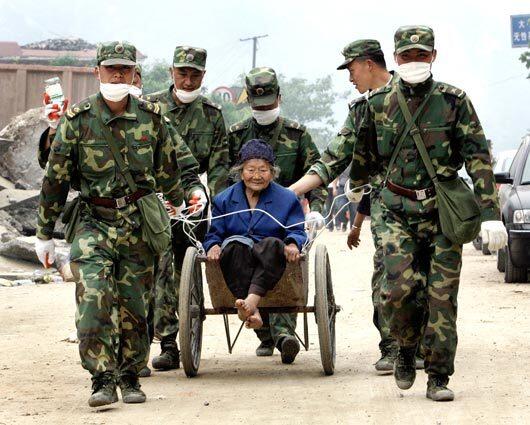
Chinese soldiers uses a trolley to transfer an elderly woman in Beichuan county. (Andy Wong / Associated Press)
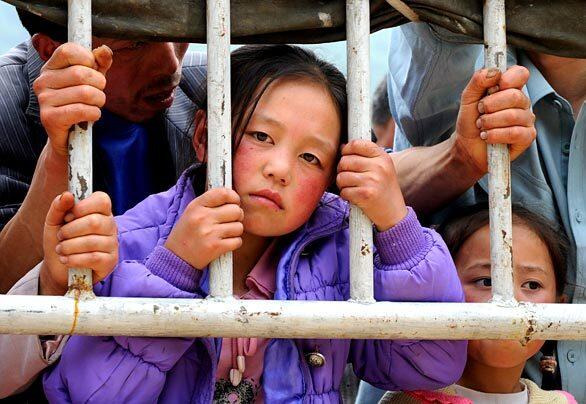
Earthquake survivors sit in a truck as they await evacuation from Beichuan, one of the areas hit hardest by the earthquake. (Mark Ralston / AFP/Getty Images)
Advertisement
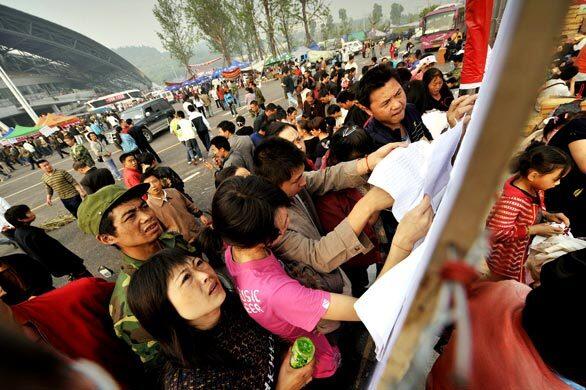
Earthquake survivors look at lists of missing persons at the local sports stadium in Mianyang City, where more than 10,000 people have taken refuge. (Peter Parks / AFP/Getty Images)
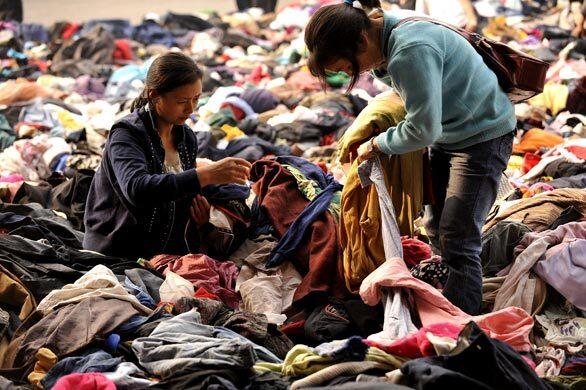
Earthquake survivors look through a pile of donated clothes at Jiuzhou Stadium in Mianyang. (Peter Parks / AFP/Getty Images)
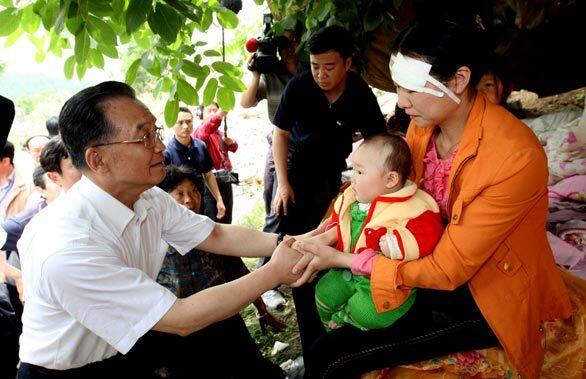
Chinese Premier
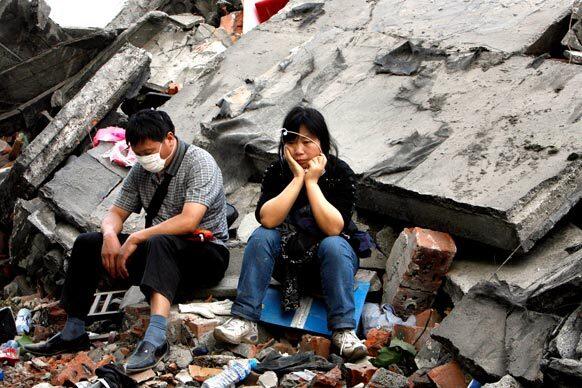
Li Wenquan, left, and wife Wang Tingting wait to learn the fate of their son, one of hundreds of students buried in rubble three days after the collapse of Dongqi Middle School in Hanwang, China. Authorities said the death toll from the magnitude 7.9 earthquake might reach 50,000. (Barbara Davidson / Los Angeles Times)
Advertisement
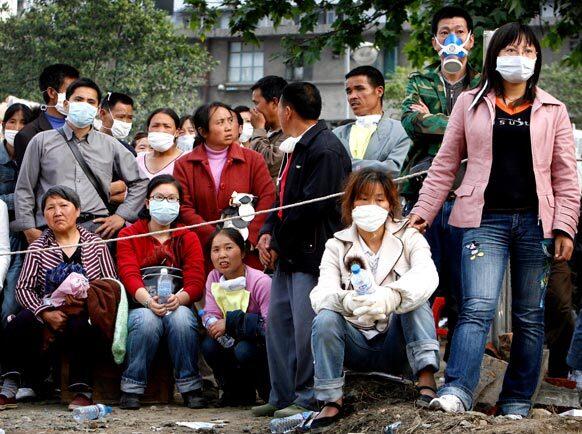
Family members wait as the bodies of students are pulled from the site of Dongqi Middle School in Hanwang, China. About 300 of the 600 students who were in the four-story school building when it collapsed in the earthquake are buried in the rubble. (Barbara Davidson / Los Angeles Times)







